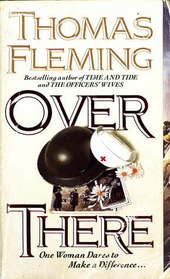From Kirkus Reviews
Historical novelist Fleming (The Officer's Wives, 1981; Time and Tide, 1987, etc.) offers a melodramatic saga set against the backdrop of the First World War. American Polly Warden, an incipient feminist and active pacifist, turns down marriage to a millionaire to go off to Paris in 1917, seeking nobility in the ravages of war. As a nurse in a French hospital, she becomes romantically involved with a disillusioned young surgeon, in large part as defense against the horrifying reality of the front lines. After the doctor's tragic death, his very rich father tries to use Polly's pacifist background as part of a secret plan to surrender his country to Germany (there was a great internal struggle about whether to continue the war effort in France in the months just prior to the arrival of the American forces). Instead, she ends up working as a counteragent on behalf of Clemenceau (sacrificing much of her reputation in the process), then becomes an ambulance driver, first for the British, later for the Americans. All of this intertwines her life with that of General Malvern Hill Bliss, who has been rescued from incipient alcoholism and self-destruction (brought on by the loss of his wife and son in the Philippines) by ``Black Jack'' Pershing and put in charge of the Lafayette Division, one of the first American units in Europe. Bliss, aided in no small part by the insights of the beautiful Englishwoman Anita Sinclair, sees through the politics and hypocrisy of British and French commanders who want to misuse American forces, but he's powerless to do much about it. As the war reaches its bloody climax, he can only send his men to die needlessly.
Historical novelist Fleming (The Officer's Wives, 1981; Time and Tide, 1987, etc.) offers a melodramatic saga set against the backdrop of the First World War. American Polly Warden, an incipient feminist and active pacifist, turns down marriage to a millionaire to go off to Paris in 1917, seeking nobility in the ravages of war. As a nurse in a French hospital, she becomes romantically involved with a disillusioned young surgeon, in large part as defense against the horrifying reality of the front lines. After the doctor's tragic death, his very rich father tries to use Polly's pacifist background as part of a secret plan to surrender his country to Germany (there was a great internal struggle about whether to continue the war effort in France in the months just prior to the arrival of the American forces). Instead, she ends up working as a counteragent on behalf of Clemenceau (sacrificing much of her reputation in the process), then becomes an ambulance driver, first for the British, later for the Americans. All of this intertwines her life with that of General Malvern Hill Bliss, who has been rescued from incipient alcoholism and self-destruction (brought on by the loss of his wife and son in the Philippines) by ``Black Jack'' Pershing and put in charge of the Lafayette Division, one of the first American units in Europe. Bliss, aided in no small part by the insights of the beautiful Englishwoman Anita Sinclair, sees through the politics and hypocrisy of British and French commanders who want to misuse American forces, but he's powerless to do much about it. As the war reaches its bloody climax, he can only send his men to die needlessly.





